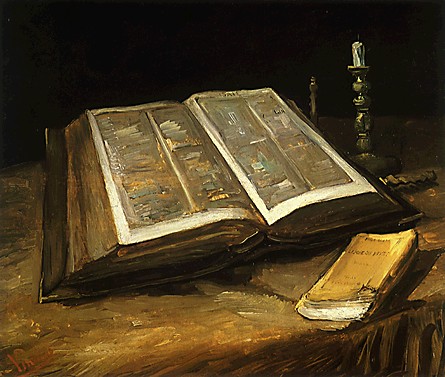|
The Word is not enough
Much dissension and strife in the church of Jesus Christ emanates from the tendency to put an exclusive responsibilty on the Word of God to provide authoritative guidance on every issue of life.
by Watchman
 IN SPITE of all the attacks upon it, the Bible is the utterly unique, inspired, eternal, comprehensive, complete and unchanging Word of God. It is God’s written revelation to mankind; and in purpose and in fact it stands from age to age in defining his character, will and purposes. IN SPITE of all the attacks upon it, the Bible is the utterly unique, inspired, eternal, comprehensive, complete and unchanging Word of God. It is God’s written revelation to mankind; and in purpose and in fact it stands from age to age in defining his character, will and purposes.
However, by the Bible’s own admission, it is incapable of controlling the affairs of the human heart (Romans chs. 7&8). And for all the standards that it sets from the lives of individuals, societies and nation it is incapable on its own of bringing correction and salvation. So Jesus needed to come.
Neither does the Bible legislate for every aspect of life. At the risk of appearing trivial, nowhere in the Bible does it tell us which side of the bed to sleep on or what colour of socks to wear. And on major decisions such as marriage, career and employment the Bible does not, nor did it ever set out to, set out this type of detail for our individual lives.
Reformation mistakes
Yet, in their commendable zeal to correct the deviant church of the day, this is the great mistake that the early 16/17th-century reformers made. And in those circumstances where, in their opinion, the Bible failed to adequately define everything to their satisfaction, they made up rules of their own. They did all this with the best of intentions but sometimes with disastrous consequences (see Footnote - Ed.).
And if any recent example of such difficulties is needed, we need look no further than the tangled knot which currently has the Free Church in a double bind on the subject of ‘worship’.
Philosophical debate
In terms of interpreting the Bible with regard to our behaviour, there are two opposing schools of thought. The Regulative Principle teaches that we should do nothing that is not specifically commanded while the Normative Principle allows us to do anything that is not expressly forbidden.
Having said that, forget this philosophical sophistry: the debate(s) will go on until Kingdom come.
What is abundantly clear and irrefutable is that the Bible does not set out to be, nor could ever be, the determinant of every single decision and action.
Broad brush and daily living
To use the analogy of a large organisation, the company board sets out the aims, policies, ethos, ethics and general practices to be employed within the organisation. However employees will rely upon, and be directed in their daily tasks by their immediate supervisors. (Of course these supervisors should never be found to be giving directions which are contrary to the general wishes of the Board. Neither will the Holy Spirit give any instruction which is contrary to the will of the Father or out of line with His Word.)
Where to for directions?
Jesus gave an answer to this question when prior to his departure said: “ But I tell you the truth: It is for your good that I am going away. Unless I go away, the Counselor will not come to you; but if I go, I will send him to you. (John 16:7) and “when he, the Spirit of truth, comes, he will guide you into all truth. He will not speak on his own; he will speak only what he hears, and he will tell you what is yet to come. (John 16:13).
We need to accept -
- the finite understanding of the human mind (1 Cor. 13:12) and
- the need to be led not just by the Word but by the Spirit (each with their different but complementary functions and dynamics)
The law (and legalism) brings death, but the Spirit brings freedom and life (Rom 8:2). This contrast is – sadly and often – all too painfully obvious.
“All Word and no Spirit we dry up.
"All Spirit and no Word we blow up.
"With the Spirit and the Word we grow up.”
Ed footnote:
It is hoped in the near future to look at some of the issues – perennial and contemporary – that stem directly from historical reformation creeds and practices.
|
Watchman, 10/01/2011
|
|
|
|